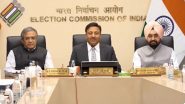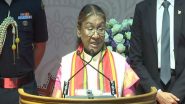Harare (Zimbabwe), Dec 24 (AP) In Southern Africa, where democracy remains relatively stable, elections held in 2024 saw long-governing liberation parties struggling to survive.
Across Africa, power struggles involving military governments, coup attempts and armed conflict are common, but the southern region has largely been more stable and elections in some countries brought joy and hopes of a better future.
Not so much though for some long-governing parties. The decades-old goodwill of liberating their countries from colonial rule appears to be giving way to frustration over economic problems and limited opportunities for young people in the region.
As voters become younger, and without personal memories of colonialism, which ended before they were born, liberation struggle-era parties in Southern Africa lost power or were given a wake-up call in 2024.
For many young voters, performance of the government matters more than historic liberation struggle era credentials that these parties have relied on to stay in power for decades, resulting in “the shifting political tectonic plates we are seeing,” said Nic Cheeseman, a political scientist and professor at the University of Birmingham in England.
“Generational change is an important factor in the shifting political tectonic plates we are seeing. People want jobs and dignity — you can't eat memories,” said Cheeseman, who researches African politics.
Botswana, a tiny nation of about 2.5 million people with a history of democratic stability, provided the biggest shock as the economy suffered from a global downturn in demand for mined diamonds, and levels of youth unemployment rose.
Opposition supporters dressed in blue and white took to the streets to celebrate, while then President Mokgweetsi Masisi conceded defeat even before the vote count was over following an election held in late October. The opposition landslide marked the end of the 58 years in power of the Botswana Democratic Party, which had governed the country since independence from the United Kingdom in 1966.
Months earlier, South African voters turned against the African National Congress, the party led by anti-apartheid icon Nelson Mandela in the 1990s. In May, the ANC lost its majority, forcing it to share power with the opposition.
The result put South Africa on an uncharted political path for the first time since the end of apartheid three decades ago. The ANC has been gradually losing support since the 2009 national election, also ceding political control of major cities because of widespread discontent over corruption, service delivery failures and economic struggles. However, its drop from 57.5% of support to 40% in May was its biggest loss yet.
In Namibia, the candidate of the long-governing South West Africa People's Organization, or SWAPO — 72-year-old Netumbo Nandi-Ndaitwah — made history by becoming the country's first female president.
However, SWAPO won 51 seats in the parliamentary vote, only just passing the 49 it needed to keep its majority and narrowly avoiding becoming another liberation struggle party to be rejected in Southern Africa this year. This marked SWAPO's worst parliamentary result since Namibia gained independence from South Africa's apartheid government in 1990, signaling a potential shift in the country's political landscape.
Many liberation governments have reason to be worried even though the consistency of democratic processes could be lauded, said Nicole Beardsworth, politics researcher and lecturer at the University of the Witwatersrand in Johannesburg.
“What we see in Southern Africa is a relative stability in terms of democratic standards, where citizens seem to believe that their votes matter and that they count. So this does present a concern for ruling parties,” Beardsworth said.
In Mozambique, results that extended the governing Frelimo party's nearly half-century in power following an election in October ignited protests that resulted in the death of at least 100 people, according to Amnesty International.
Exiled opposition leader Venancio Mondlane, capitalizing on growing youth discontent in the country of 34 million people, has challenged the election outcome in court. Also, he has continued calling for protests that range from street marches to road and border blockades and the banging of pots.
A similar situation occurred in January in the Indian Ocean island nation of Comoros, where news of incumbent President Azali Assoumani winning a fourth term triggered violent unrest that left one person dead and scores others injured.
Cheeseman, the political researcher, said that protests, including in countries where democracy is thwarted, reflect “growing signs — from protests to online dissent — that public opinion is already turning.”
“Even citizens who have lost faith in democracy want responsive and accountable government, and to have their voices heard,” he said.
Elections swept away ruling parties in several countries elsewhere in the region and across the economically troubled continent of more than 1.4 billion people and home to the world's youngest population.
The Indian Ocean island of Mauritius, one of Africa's most stable democracies, saw an opposition coalition grab all contested parliamentary seats, driving out the government led by Pravind Jugnauth, who was replaced by former Prime Minister Navin Ramgoolam.
In West Africa, Senegal in March elected previously little-known 44-year-old Bassirou Diomaye Faye, who became the continent's youngest leader.
Faye defeated rivals who included a former prime minister who was backed by then incumbent Macky Sall, just a few weeks after being released from prison to run in the polls. And hopes for change continue running high in a country where more than 60% of the population is under age 25 and 90% work in informal jobs, after Faye's PASTEF party won 130 of 165 seats.
Former President John Dramani Mahama returned to power in Ghana, as voters vented their anger over the policies of outgoing President Nana Akufo-Addo in early December. The 65-year-old Mahama's National Democratic Congress also won the majority in parliament. (AP)
(This is an unedited and auto-generated story from Syndicated News feed, LatestLY Staff may not have modified or edited the content body)













 Quickly
Quickly















